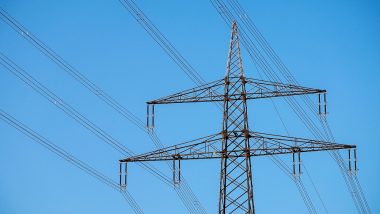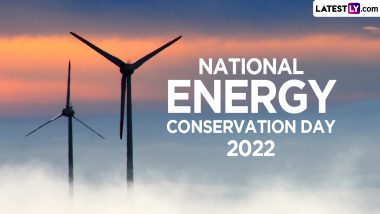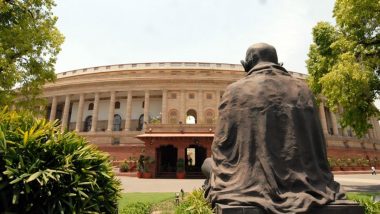To say ‘Energy is the mother of all forms of life on Earth’ wouldn’t be an over-statement. Consequentially, conserving energy or using it optimally is our only hope to sustain life in the near future’.
The National Energy Conservation Day is celebrated every year, across all parts of India to make people aware of the dire need to focus our attention towards energy conservation and efficiency. The day is celebrated on 14th December under the Energy Conservation Act, executed by the Bureau of Energy Efficiency in 2001, as part of the nation's overall effort towards Climate change mitigation. National Energy Conservation Day 2020 Date And Theme: Know The History And Significance of the Observance That Promotes Electricity Conservation.
While Earth provides enough to fulfill every man’s need, it crumbles to fulfill man’s indiscriminate greed. Natural Resources like Fossil fuels, Crude oil, coal, natural gas, etc. are available on Earth in abundant quantities and have the potential to generate huge amounts of energy. However, its increasing demand and rapid depletion is a threat that looms large on our generation and the generations to come.
However, even in these critical circumstances, India stands out as a World leader and paves the way, not just in energy efficiency and conservation but also in reversing the effects of climate change.
India Paves the Way for the World:
Out of the 198 countries to sign the historic Paris Agreement of 2015 to reverse climate change, India is among one of the few countries to effectively accomplish its goals and fulfill its promises.
Also, according to the Global Carbon Budget Report, 2020 India recorded a 9% reduction in its CO2 emissions, which is 2% more than that recorded in the World at large (7%).
The Indian Government is continuously promoting the cause of energy efficiency and conservation through its multiple schemes and policies:
Standardisation & Labeling of Electric Appliances by BEE:
The government’s program to standardize and label electric appliances to provide the consumers with an informed choice of energy efficiency and cost-cutting was aimed to reduce the energy consumption of appliances.
UJALA Scheme:
The ‘Unnat Jyoti Affordable LEDs for All’ scheme was started by the Government with the twin goal to achieve energy efficiency and affordability as these bulbs use only one-tenth of the energy used by an ordinary bulb and also reduce electricity bills, thereby preserving the environment.
As per the report released by R.K.Singh, the Union Minister of State (IC), Power and New & Renewable Energy on May 6, 2020, for the year 2018-19, the total energy savings achieved due to energy efficiency measures is 23.73 Mtoe (million Tonne of Oil Equivalent), which is 2.69% of the total primary energy supply (estimated to be 879.23 Mtoe in India).
Towards Energy-Efficient AatmaNirbhar Bharat:
India is set to witness a transition in its energy sector with several projects lined up to revolutionize the scope of the Indian energy sector:
- With 175 GW of installed capacity of renewable energy by 2022, electricity supply will be ensured to all, e-mobility will be promoted and electrification of the railways and 100% electrification of households will be made possible.
- By 2022, the Indian Government is set to use solar energy for agricultural pump sets and to promote clean cooking.
- National Electric Mobility Mission Plan (NEMMP): Under this scheme, the government aims to promote Electric-Vehicles with the objective to reduce the adverse effect of vehicles on the environment and the conservation of our natural resources.
- As per the IEA- India Report (2017-18) the successful implementation of Energy Efficiency Measures contributed to electricity savings of 86.60 BUs and a reduction of 108.28 million tonnes of CO2 during 2017-18.
(The above story first appeared on LatestLY on Dec 14, 2020 09:34 AM IST. For more news and updates on politics, world, sports, entertainment and lifestyle, log on to our website latestly.com).













 Quickly
Quickly




















